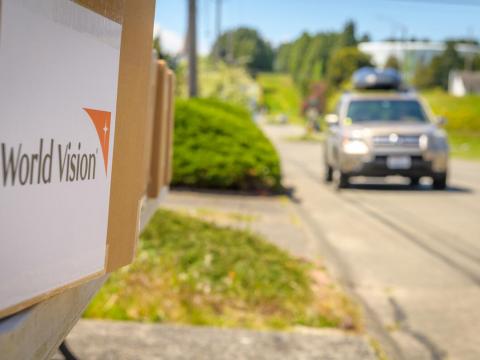
No sense in speeding
By Neil Bullock
I’m not saying I drive slower than your grandmother. I’m not saying I’m the driver holding up a line of traffic behind me as I insist on driving to the conditions and keeping to the speed limit.
But I am the guy who raises my eyebrows when I hear people talking about going above the speed limit. I’m the man who is seriously unimpressed (that’s the polite way of putting it) when I see erratic or fast driving. I’m the one who will remind anyone who will listen that the speed limit is a guide, not a target, and that if the conditions change, you should reduce your speed. As a former police officer, and father of two now-grown children, I have been in too many situations where people needed a more-than-gentle reminder of why reducing speed is important.
I oversee World Vision’s global fleet of 10,000+ vehicles so it’s a good thing I feel so passionately about road safety. And yes, it is possible to be passionate about travel safety. And no, being passionate about this is not something confined to first responders who have attended too many horrific, unforgettable road traffic collisions, and had to tell too many (one is too many) family members news that will forever change their lives. Passion for making sure our staff can travel safely from one place to another is something I think we probably all share, even if we don’t think about it often.
I'll tell you a secret... Regardless how good a driver you think you are, you can’t control what others do. The one thing you can control – your speed – is one of the biggest factors that affect the outcome of any crash you are unlucky enough to be involved in.
EVERYTHING is affected by the speed at the point of collision. People’s reactions, the accidental neglect to put your seatbelt or helmet on. Every year, more than 1.3 million people are killed in road traffic collisions around the world. And tragically, aid workers are responsible for some of these. People who dedicate our lives to saving others are sometimes responsible for taking lives, and inflicting injuries.
It’s one of the hardest parts of work to talk about openly. Of course, not all of these are the fault of our staff, and not all of them involve speed. But each one causes untold financial and tragic human cost. We can’t accept this as a certainty, or assume it’s the cost of doing business. If every one of us committed, today, to keeping to the speed limit no matter what, then we could all feel safer in the knowledge that the risks facing children, mothers, fathers, brothers, and sisters in the communities we live and work with will be greatly reduced.
Before you think this isn’t a problem that affects you, and it’s the fault of the people behind the wheel, know this:
- The drivers I’ve met are some of the best, smartest, most passionate, qualified and dedicated humanitarians I’ve worked with my career. Without them, quite literally we would not be able to do what we do.
- When was the last time you went above the speed limit, or were a passenger in a vehicle going above the speed limit and said nothing about it? Individual actions and responsibility save lives.
Neil is World Vision’s Director of Global Fleet.


